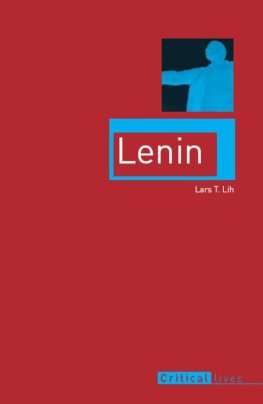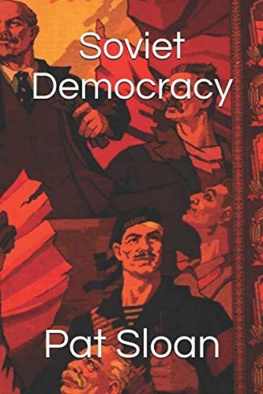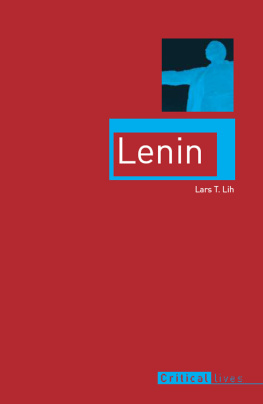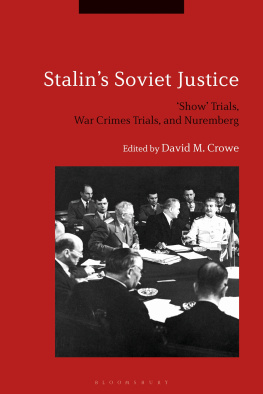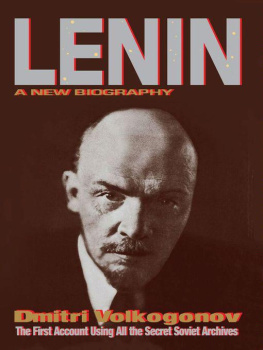Andrey Yanuaryevich Vyshinsky - Lenin and Stalin: The Great Organizers of the Soviet State
Here you can read online Andrey Yanuaryevich Vyshinsky - Lenin and Stalin: The Great Organizers of the Soviet State full text of the book (entire story) in english for free. Download pdf and epub, get meaning, cover and reviews about this ebook. City: Moscow, year: 1949, publisher: Foreign Languages Publishing House, genre: History. Description of the work, (preface) as well as reviews are available. Best literature library LitArk.com created for fans of good reading and offers a wide selection of genres:
Romance novel
Science fiction
Adventure
Detective
Science
History
Home and family
Prose
Art
Politics
Computer
Non-fiction
Religion
Business
Children
Humor
Choose a favorite category and find really read worthwhile books. Enjoy immersion in the world of imagination, feel the emotions of the characters or learn something new for yourself, make an fascinating discovery.

- Book:Lenin and Stalin: The Great Organizers of the Soviet State
- Author:
- Publisher:Foreign Languages Publishing House
- Genre:
- Year:1949
- City:Moscow
- Rating:4 / 5
- Favourites:Add to favourites
- Your mark:
- 80
- 1
- 2
- 3
- 4
- 5
Lenin and Stalin: The Great Organizers of the Soviet State: summary, description and annotation
We offer to read an annotation, description, summary or preface (depends on what the author of the book "Lenin and Stalin: The Great Organizers of the Soviet State" wrote himself). If you haven't found the necessary information about the book — write in the comments, we will try to find it.
Andrey Yanuaryevich Vyshinsky: author's other books
Who wrote Lenin and Stalin: The Great Organizers of the Soviet State? Find out the surname, the name of the author of the book and a list of all author's works by series.
Lenin and Stalin: The Great Organizers of the Soviet State — read online for free the complete book (whole text) full work
Below is the text of the book, divided by pages. System saving the place of the last page read, allows you to conveniently read the book "Lenin and Stalin: The Great Organizers of the Soviet State" online for free, without having to search again every time where you left off. Put a bookmark, and you can go to the page where you finished reading at any time.
Font size:
Interval:
Bookmark:
Foreign Languages Publishing House
Moscow 1949
The Soviet state recently celebrated its thirtieth anniversary. This momentous and historic dateanniversary of the victory of the Great October Socialist Revolution, which ushered in a new era in the history of mankindwas marked by a new upsurge of enthusiasm of the whole Soviet people. And once again, in these festive days, millions and millions of Soviet men and women, workers, peasants, intellectuals, turn their thoughts, in deepest gratitude, to the great leaders and organizers of the socialist stateto Lenin and Stalin, whose brilliant discoveries in the realm of state construction, whose indefatigable activities in the organization and consolidation of the Soviet state made possible the transformation of our country from the backward, semi-colonial land of the tsars into a mighty and invincible socialist state of workers and peasants.
The great advance and victory of scientific Socialismthat militant theory of the proletariat, that revolutionary theory without which, as Lenin declared, there can be no revolutionary movementare inseparably bound up with the names of Lenin and of his great comrade-in-arms, the continuer of his work, Stalin. Lenin not only preserved the great teachings of Marx and Engels, not only saved these teachings from perversion and vulgarization and cleansed them of the opportunist distortions and falsifications introduced by pseudo-Marxists of the type of Kautsky, Bernstein, David and their ilk, not only restored Marx's original ideas in all their integrityLenin further elaborated them, he advanced the theory of scientific Socialism and formulated new principles in conformity with the experience of the proletarian revolution of the twentieth century.
Stalin has defined Leninism as Marxism of the era of imperialism and proletarian revolution. He has demonstrated that Leninism is the direct continuation and development of Marxism, a development organically linked with the specific features of the time in which Lenin, true follower of Marx and Engels, lived and worker.
Coming as the further development of the ideas of Marxism, Leninism enriched the theory of scientific Socialism with new conclusions and new laws of social development. These conclusions and laws were placed at the basis of the strategy and tactics of the proletarian revolution in the face of the new tasks arising from the specific features of the new era. Lenin was a brilliant innovator in the revolutionary theory of Marxism.. He demonstrated in practice his loyalty to that basic principle of genuinely scientific theory: the necessity of constantly developing and advancing science, never marking timeof treating science, not as a dogma, but as a guide to action.
Lenin's article "Our Program," written in 1898, points out with remarkable clarity the importance of innovation in science. Writing of Marx's theory, Lenin stated emphatically in this article that "... this theory was the first to transform Socialism from a utopia into a science, to lay down a firm foundation for this science and to indicate the path that must be followed in further developing this science and elaborating it in all its parts."1 Further, he stressed the service rendered by Marxist theory in that "it taught us how, beneath the surface of rooted customs, political intrigues, abstruse and intricate doctrines, to discern the class struggle."1
1 Lenin, Marx-Engels-Marxism, Eng. ed., Moscow 1947, p. 111.
Lenin indignantly condemned those "thereticians" who "have not taught the proletariat any new methods of struggle" and who "have not advanced one single step the science which Marx and Engels enjoined us to develop."2
2Ibid., p. 112.
Of such theoreticians, whom he ironically dubbed "renewers," Lenin wrote that "they only moved backward, picking up fragments of obsolete theories and preaching the theory of compliance instead of the theory of struggle to the proletariat."
"We," Lenin continued, "do not regard Marx's theory as something final and inviolable; on the contrary, we are convinced that it has only laid the cornerstones of the science which Socialists must advance in all directions if they do not want to lag behind the march of life."3
3Ibid., pp. 112-13.
We must also mentioned here Lenin's notable idea that "an independent elaboration of Marx's theory is especially necessary for Russian Socialists, since this theory provides only general guiding principles which, in particular, are to be applied differently to England than to France, differently to France than to Germany, differently to Germany than to Russia."4
4Ibid., p. 113.
Lenin followed the path he himself had indicated in the elaboration of Marxist theory; and he inaugurated a new era in the development of Marxist theoretical thought. Lenin developed and further advanced the Marxist teaching on the proletarian revolution, on dictatorship and democracy, on the state, and, in particular, on the socialist state.
Lenin's theory of socialist revolution, further developed by Stalin, armed our people with a clear prospect in their struggle: the prospect of the victory of Socialism. Sternly combating those enemies of the people, the Trotskyite and Bukharinite conspirators, Lenin and Stalin proved that Socialism can be built in a single country. With this inscribed on their banner Lenin and Stalin led the Soviet people forward in the heroic effort which achieved the organization of a new, socialist society, the reorganization of economic and social relationships in the U.S.S.R. on socialist foundations. Advancing along the lines which Lenin had mapped out, the Soviet people under Stalin's guidance, launched and completed the construction of a socialist society and a socialist state.
The Soviet system and the Soviet state grew and strengthened with every passing year. The Soviet state became a mighty socialist powerthe bulwark, the defence and hope of the people of the Soviet Unionan invincible socialist state of workers and peasants.
Leninism teaches that the cardinal question of revolution is the question of state power. The capture of the power of state, and the direction of all action by the statethat potent mechanism for the accomplishment of political aimsto serve the interests of the class which dominates in the given society, is the prime and decisive object of revolution.. One of Lenin's greatest contributions to Marxist teaching lies in his discovery of the Soviets as the new form of state organization, the new type of state, required to effect the political and social emancipation of the working people.
The importance and significance of the state for the emancipation of the working people, for the promotion of socialist construction, were demonstrated by the very course of events, by the practical experience of the struggle for Socialism. At the outset of the October Revolution, however, this was still a debated question, and object of passionate disagreement. That was quite natural. For one thing, state authority is by its very nature an instrument of considerable intricacy and sensitivity; for another, the concepts of state authority and state apparatus were linked up in the minds of the masses with prejudices arising from the adverse role played in history by the state as an instrument for the oppression of the people. Lenin devoted no little effort to explaining the bias, the harmfulness to the proletarian revolution, of the conceptions of the state preached by various opportunist groupings.
In December 1917 Lenin was again obliged to come out against the opportunists, explaining the importance and significance of the state for the proletarian revolution and setting forth the essence of the proletarian state, which carries out the will of the people the will of the workers and peasants.
Font size:
Interval:
Bookmark:
Similar books «Lenin and Stalin: The Great Organizers of the Soviet State»
Look at similar books to Lenin and Stalin: The Great Organizers of the Soviet State. We have selected literature similar in name and meaning in the hope of providing readers with more options to find new, interesting, not yet read works.
Discussion, reviews of the book Lenin and Stalin: The Great Organizers of the Soviet State and just readers' own opinions. Leave your comments, write what you think about the work, its meaning or the main characters. Specify what exactly you liked and what you didn't like, and why you think so.

